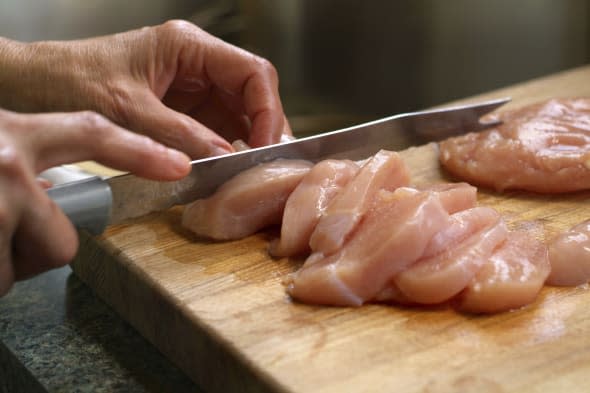Foods to avoid if you're over 65

Pic: Getty Images
Food poisoning is an unpleasant experience at best for the majority of people, but for the over-65s it can be a serious problem. Older people are not only at a higher risk of food poisoning, they are also often less well equipped to fight back against bacteria.
Related Searches
As we age, our immune system weakens slightly, making it tougher for the body to beat off food poisoning bugs, and complications such as dehydration can exacerbate the problem. It is therefore even more important to avoid falling victim to contaminated food, so here are some of the bites to beware of.
Raw and undercooked meat
Most of us will be extra careful when cooking chicken or turkey, since poultry is renowned for harbouring nasties like salmonella and E.coli, but rare or undercooked meats of all sorts could cause a problem. Barbecues, where the meat may appear well done on the outside but is not cooked through, are a particular danger area.
To be safe, ensure that any meat is cooked right through (in poultry the juice should run clear when pierced in the fattest section), and prevent the spread of any potentially harmful bugs by thoroughly washing your hands, knives and surfaces after handling raw meat of any kind. Consumers were also warned recently not to wash raw chicken, as it can spread campylobacter bacteria more easily onto hands, surfaces, clothing and cooking equipment.
Seafood
Once again the danger comes when fish or shellfish is raw. Be extra careful with shellfish such as oysters, mussels, clams, and even lobster and crab, and if you're a dab hand at homemade sushi, it's best to freeze the fish first (for at least four days), as this will kill any bugs before you tuck in. The shop-bought variety is usually frozen before preparation and is therefore usually safe.
Dairy
The majority of Britons will drink pasteurised or UHT milk as a matter of course, but if you are a fan of farmer's markets or local farm shops, check to see if their milk is unpasteurised, as this could be a source of food poisoning.
Likewise, cheese can be a risky business, but it is generally the soft products that are best avoided. Mould-ripened varieties such as brie and camembert, along with soft blues like gorgonzola and roquefort contain less acid and more moisture than their hard counterparts, and unfortunately that makes for an ideal environment for the likes of listeria.
Processed meats
Cured or fermented meats such as Parma ham, chorizo and salami make for a tempting snack or cooking ingredient, but they're also a temptation for parasites that can cause toxoplasmosis. The heat of cooking will usually kill any nasties hidden within, but to be on the safe side, freeze cold meats for four days before eating. Sadly pate may be off the menu as well, since chilled or fresh comes with a risk of listeria.
%VIRTUAL-AFCSponserAds%
Runny eggs
Eggs are a healthy way to start the day, but as you get older, it could pay to go hard boiled. Raw or runny eggs can contain salmonella, a potentially serious problem for older folk, so products such as mayonnaise or hollandaise sauce are best avoided.
Bean sprouts
As unlikely as it may seem, bean sprouts can hide a nasty little secret in the form of bacteria, the reason being that the warm, moist conditions required to grow them makes for a cosy home for food poisoning bugs. You can, however, enjoy them as long as they are thoroughly cooked and steaming hot throughout.




